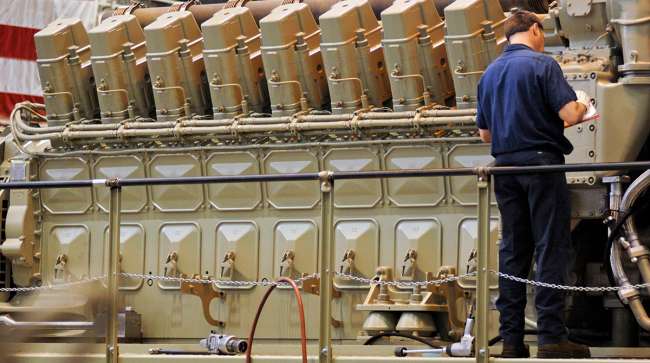GE to Cut 575 Jobs at Century-Old Locomotive Plant

General Electric Co. plans to end most locomotive manufacturing at a century-old Pennsylvania factory as the company looks to cut costs amid a sharp downturn in the domestic rail market.
As many as 575 jobs would be eliminated from the Erie plant through 2018 as GE shifts production for international customers to a facility in Fort Worth, Texas, said the head of the company’s transportation business. Workers in Pennsylvania were told July 27 of the proposal, which is subject to a 60-day bargaining period with union officials.
“We’ve been operating in a challenged North American locomotive market,” Jamie Miller, CEO of GE Transportation, said in a telephone interview. “This action is taken so we can be as competitive as we can be.”
Trimming costs is a priority across GE as it looks to strengthen operations after several quarters of weak earnings and a slumping stock price. The Boston-based manufacturer agreed earlier this year to deeper cost cuts through 2018 following discussions with shareholder Trian Fund Management, the firm co-founded by Nelson Peltz.
About 2,000 jobs will remain in Erie, which is still the largest GE Transportation site, Miller said. While some component manufacturing will stay, the facility will be focused primarily on design, engineering and prototyping. No jobs are moving overseas, she said.
Union Reaction
There’s “a lot of anger” that the company would take this step despite recent improvements to the facility’s efficiency, said Scott Slawson, president of Local 506 of the United Electrical Radio & Machine Workers, which represents about 1,500 active employees at the plant. He’s worried that the final job-loss tally could grow if managers and other positions related to locomotive production are cut.
“We have people that have been in that plant for almost 50 years building locomotives,” said Slawson, a 13-year veteran of the company. “This is going to be devastating for the community.”
GE Transportation has been battered by a drop of about 10% in the last couple years in North American freight railcar loads. Thousands of locomotives are sitting unused amid dwindling coal production and less demand for crude-oil transport. The division’s sales fell 21% last year to $4.71 billion and have continued sliding in 2017.
A bright spot has been international demand, Miller said. The company, which is working through a 1,000-locomotive order from India, signed agreements recently in countries such as Egypt and Pakistan.
“The global market for us has been quite healthy,” she said. “We’re shifting to more predominantly international, and it places more pressure on the cost structure and our need to compete.”
About 225 workers could be recalled at the Fort Worth plant after the company had previously announced some layoffs there, Miller said. GE Transportation has about 9,500 total employees. The transfer of work is also expected to generate as many as 200 new positions at GE’s suppliers, she said.
The Pennsylvania factory has been a flash point for GE and organized labor in recent years as the company has gradually shifted work to Fort Worth, where workers aren’t represented by a union.




